Intentar ORO - Gratis
KEEP THE COLD OUT
The Home Handyman
|Jul/Aug'25
Did you know that homes in South Africa are either insulated to a poor standard, compared to European nations, or have no form of insulation at all. In 2011 our National Building Regulations made it compulsory to fit thermal insulation in new buildings and additions to building structures.

Even though the regulation does not extend to homes built before 2011, the benefit of having your ceilings, roofs, pipes and geysers insulated is undeniable, especially with escalating electricity tariffs. Chairperson at Thermal Insulation Products and Systems Association of SA (TIPSASA), Des Schnetler says home insulation has the potential to save money on energy costs and supports a sustainable environment.
He says that finances are always a major deterrent when considering home insulation. “While life cycle costing shows that using insulation pays for itself, many homeowners, building-owners and builders are more interested in reducing initial cost than minimising total costs, which includes operating costs, both heating and cooling.”
Des says that a home built more than 10 years ago can usually have insulation retrofitted to improve efficiency. “Of utmost importance is selecting a product best suited for the application and specific climatic zone.”
How thermal insulation works
Insulating a home basically means having it wrapped in a ‘protective blanket’ to reduce the transfer of heat into and out of the building. In winter it reduces the rate at which heat is lost from inside, and in summer it reduces the rate of heat entry into the building.
For example, on a hot day, an uninsulated home will conduct heat easily through the roof, windows and walls from the outside. This raises the temperature of the home on the inside.
Isoboard’s Mark Russell says that the range of human comfort inside a home is usually between 20° and 27° Celsius. “This comfort range varies in different climatic regions, as well between summer and winter, and even between how males and females perceive being comfortable. Your perception of comfort is also influenced by how acclimatised you are to your environment, how appropriately you are dressed, air flow, as well as other factors.”
Esta historia es de la edición Jul/Aug'25 de The Home Handyman.
Suscríbete a Magzter GOLD para acceder a miles de historias premium seleccionadas y a más de 9000 revistas y periódicos.
¿Ya eres suscriptor? Iniciar sesión
MÁS HISTORIAS DE The Home Handyman

The Home Handyman
KEEP YOUR HOUSE CRITTER FREE
With winter fast approaching, outdoor critters seeking to regulate their temperature are trying their best to get inside. Ants, spiders, moths, mosquitoes, fruit flies, stink bugs, termites, silverfish, and ladybugs, to name a few, can easily make their way into homes, and once they've settled in, it's often hard to get them out.
6 mins
Jul/Aug'25

The Home Handyman
SECRET HIDEOUTS
We all have things we would prefer to keep out of plain sight - family heirlooms, wedding rings, expensive jewellery, medicines or even weapons. Sometimes we just want to keep household items hidden in order to declutter a space. Whether you want to hide items for safety or financial reasons, or simply want to keep your bedroom tidy, there are a few clever storage ideas that could help you out.
2 mins
Jul/Aug'25
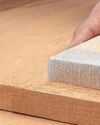
The Home Handyman
ABRASIVES DEMYSTIFIED
Abrasive materials are indispensable in countless industries, from woodworking and metal fabrication to automotive repair and electronics manufacturing.
3 mins
Jul/Aug'25
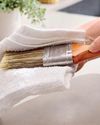
The Home Handyman
THINNERS VS. TURPENTINE
If you've ever finished a painting or staining job and been left wondering how best to clean your brushes, you're not alone. One of the most common DIY questions is: Should I use thinners or turpentine to clean my brushes? The answer depends on the type of paint or coating you've used. Using the wrong solvent can damage your brushes, or worse, make the cleaning job even harder.
2 mins
Jul/Aug'25

The Home Handyman
KEEP THE COLD OUT
Did you know that homes in South Africa are either insulated to a poor standard, compared to European nations, or have no form of insulation at all. In 2011 our National Building Regulations made it compulsory to fit thermal insulation in new buildings and additions to building structures.
5 mins
Jul/Aug'25
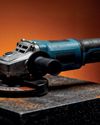
The Home Handyman
ANGLE GRINDERS — MASTERING THIS VERSATILE TOOL
When it comes to versatile tools in a DIYer's arsenal, few can match the power and practicality of the angle grinder.
2 mins
Jul/Aug'25

The Home Handyman
KITCHEN CARE – MAINTENANCE TIPS FOR KEY AREAS
The kitchen is the heart of the home where meals are made, memories are shared, and chaos sometimes reigns. But like any hardworking space, your kitchen needs regular maintenance to keep it functional, safe, and looking great.
2 mins
Jul/Aug'25

The Home Handyman
Separating Fact from Fiction
Maintaining your home can be a daunting task, especially with the plethora of DIY tips and tricks floating around the internet.
2 mins
Jul/Aug'25
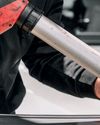
The Home Handyman
SEALANTS SIMPLIFIED: WHAT TO USE AND WHERE
Whether you’re tackling a weekend DIY fix, remodelling your home, or involved in large-scale construction, sealants are a silent hero that play a vital role in creating watertight, airtight, and secure finishes.
3 mins
Jul/Aug'25
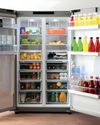
The Home Handyman
COMMON FRIDGE/FREEZER FAULTS
Your fridge freezer is one of the hardest-working appliances in your home, so when it stops performing as it should, it can cause major inconvenience. The good news? Not every fault means an expensive call-out or a trip to the shops for a new one. In many cases, you can fix the issue yourself with a little know-how and a few basic tools.
3 mins
Jul/Aug'25
Listen
Translate
Change font size
